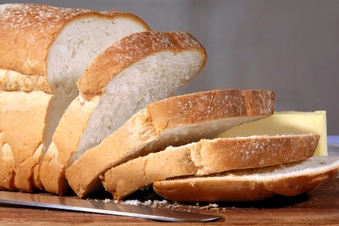Limit These Foods With Hypoparathyroidism

Eating Right With Hypoparathyroidism
When you have hypoparathyroidism, your body does not produce enough or is deficient of the parathyroid hormone (PTH), which helps regulate important vitamins and minerals in your blood, including calcium, phosphorus, and vitamin D. This leads to low levels of blood calcium and high levels of phosphorus.
While no diet can cure or prevent the condition, maintaining a healthy diet and steering clear of some food and drinks can help balance these key nutrients in your body.

Avoid Foods You Are Allergic To
An allergic reaction to food can increase inflammation in your body, which can throw off your hormone levels and thyroid function. Some studies also show that people with hypoparathyroidism can have or develop food sensitivity and other conditions, like celiac disease (which means people have a reaction to gluten, a protein found in wheat, barley, and rye).
Avoid foods you are allergic to, and consider getting tested for food allergies.

Skip Carbonated Drinks
Carbonated drinks – such as soda, sparkling water (seltzer), some energy drinks, or anything that fizzes or has bubbles – have high levels of phosphates, which can drain much-needed calcium from your bones.
It’s important to stay well-hydrated, so opt for at least 6-8 glasses of non-carbonated water a day.

Watch the Salt
Salty foods can decrease the amount of calcium your body can absorb. When you consume a lot of salt, more blood calcium is flushed out of your body through your pee. This can also lead to kidney calcification and stone formation.
To help your body keep as much bone-strengthening calcium as possible, watch the amount of salt that you use when cooking and the sodium in the food you eat by reading nutritional labels on food packaging.

Watch Out for Refined Sugar and Carbs
Limit the refined sugars and carbohydrates you eat, often found in white breads, pastas, and desserts. These have lots of phosphorus-based food additives used in processed foods. High blood phosphorus levels are linked to an increased risk of heart disease. Refined foods are loaded with sugar and are bad for overall health because they reduce the amount of calcium your body can absorb (and lower your vitamin D levels) and increase the amount of calcium that is flushed from the body through your pee.

Eat Less Red Meat and Hard Cheeses
With hypoparathyroidism, your levels of phosphorus tend to be high, so it’s best to limit foods that are high in this mineral.
Red meat is high in phosphorus, so try to get protein from plant-based sources, seeds or nuts, tofu, and beans. Hard cheeses, some forms of dairy, bread, rice, and oats are also high in phosphates.

Foods That Block the Body From Absorbing Calcium
Some foods have natural compounds that make it harder for your body to absorb calcium when they are eaten at the same time. These compounds can be found in spinach, potatoes and sweet potatoes, beets, beans, raspberries, tea, nuts, and seeds.
You don’t need to avoid these foods altogether, just try not to eat them with foods that are high in calcium, like milk and other dairy products.

Reduce Coffee, Alcohol, and Smoking
Each of these can negatively impact your health in a lot of ways. They can affect hormone levels and impact the way your body absorbs or uses calcium – both of which are important for hypoparathyroidism. You should aim to drink coffee and alcohol in moderation, and avoid smoking and tobacco use.
Show Sources
1) adamkaz / Getty Images
2) Véronique Burger / Science Source
3) Siraphol / Getty Images
4) Wavebreak / Getty Images
5) DaveBolton / Getty Images
6) (Left to right) karandaev / Getty Images, Michelle Arnold / EyeEm / Getty Images
7) (Clockwise from upper left) PoppyB / Getty Images, bit245 / Getty Images, diogoppr / Getty Images, Westend61 / Getty Images
8) (Left to right) jacqueline harriet, photographer / Getty Images, debyaho / Getty Images, brusinski / Getty Images
Mount Sinai: “Hypoparathyroidism.”
Journal of the Royal Society of Medicine: “Hypoparathyroidism and coeliac disease: a potentially dangerous combination.”
Journal of Bone and Mineral Research: “Sodium and Bone Health: Impact of Moderately High and Low Salt Intakes on Calcium Metabolism in Postmenopausal Women.”
Parathyroid UK: “Diet in Hypoparathyroidism Part 1: Calcium.”
Frontiers in Endocrinology: “The Association Between Circulating Trans Fatty Acids and Thyroid Function Measures in U.S. Adults.”
Mayo Clinic: “Trans fat is double trouble for heart health.”
Missouri Medicine: “Not Salt But Sugar As Aetiological In Osteoporosis: A Review.”
Nutrients: “The Association between the Dietary Inflammatory Index and Thyroid Function in U.S. Adult Males.”
National Health Service (U.K.): “Hypoparathyroidism.”
Cureus: “Caffeine as a Neoadjuvant Therapy in Parathyroid Adenomas: A Narrative Review.”
International Journal of Molecular Sciences: “Environmental Factors That Affect Parathyroid Hormone and Calcitonin Levels.”
The Journal of Clinical Endocrinology & Metabolism: “Hypoparathyroidism.”
Foods: “The Effect of Trans Fatty Acids on Human Health: Regulation and Consumption Patterns.”